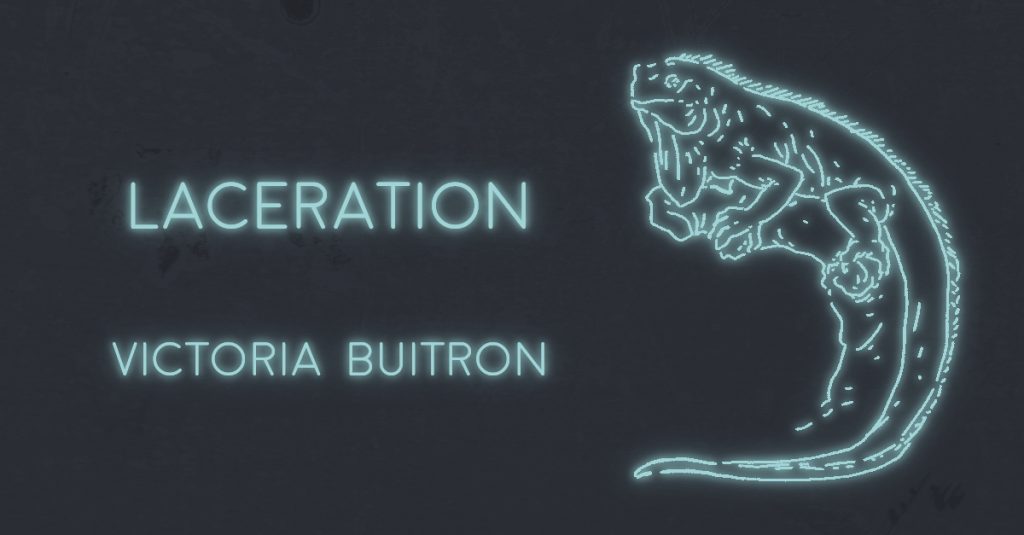
LACERATION by Victoria Buitron
When an iguana’s tail falls off after a scare, I’ve wondered if it feels the pain of a halted human heart or the shame a woman feels after being sexually assaulted in public. On many mornings, I’ve rested on a hammock below robust mango trees hoping an iguana didn’t fall on me. If a branch buckled under its weight, the crack of thin bark would reach me before I could see a green smear plop onto the ground. I’d cover my head with my arms or a book in startled anticipation. Once, my dog woke from a nap beside me and began to chase an iguana until it escaped up a tree, leaving the remnants of its panic behind. Tiny reptiles left parts of themselves around my house—shreds of their peeling skin and minute tails—but never green and black-lined flesh more than a foot long. It trembled a bit at first, as if it didn’t know yet it had been dislodged from a body, the cells still hungering for new oxygen. Eventually, it became still, leaving me to wonder what threshold of fear is required for self-amputation. How many times had I been frightened enough throughout my life that a part of me would have severed? Here I was, with those moments and my body still with me, although no longer whole, quivering at times like a loose tail after being chased.
An iguana’s stump remains a wound the first few days until it slowly begins to mend. The new tail grows the color of spoiled lime, darker, like the healing matte of a scab. The former part of them is out there, most likely in the spot they were most afraid, wasting away, and perhaps they look back at this new self, hoping there’ll never be another scare to fragment them once more. Because—if it were to happen again—how much of them would be left?
I was on a bus from Guayaquil to Milagro, and a man sat next to me and began to speak. I could tell we used to share the same skin color, but he looked so tan it seemed like he had been chafed by the sun. He showed me his ID and talked about how he was a different man from that photo. He had angered his parents by getting dreads and making the beach his home. I nodded, looked out the window as if I’d never seen the fields of banana around us. Whenever the door opened, a thick heat engulfed us as men with sweat dotting their lips sold empanadas withered by the sun. Before we arrived in my town, he announced he was getting off. I was relieved that I could enjoy some silence for the rest of the ride, but as he got up, positioned one foot in the aisle and one in our row, he grabbed my head with his hands and collided his mouth with mine. It happened so fast that I could barely push him off me, but it was enough to leave his spit on my lips. I heard him cackle as he scurried off the bus.
Maybe the difference between an iguana and me is that although we are both capable of fear, only one of us is capable of shame. The fear rushed through me when he was still on me, then came the shame, and by the time I got to the bus stop, my feelings were tangled in guilt. I shouldn’t have said a word. I should have put on headphones. I shouldn’t have given him a chance. I wanted to leave my lips behind and grow new ones, gargle vinegar until my face became numb and his taste fled my mouth. Instead, I simmered myself within scalding water—my body a fragmentation of what it was when I woke up that day. In the adrenaline of thoughts, I wished that my hair had fallen off in his hands as evidence of what he took from me. Take it, I would have said. May the sever haunt you.
